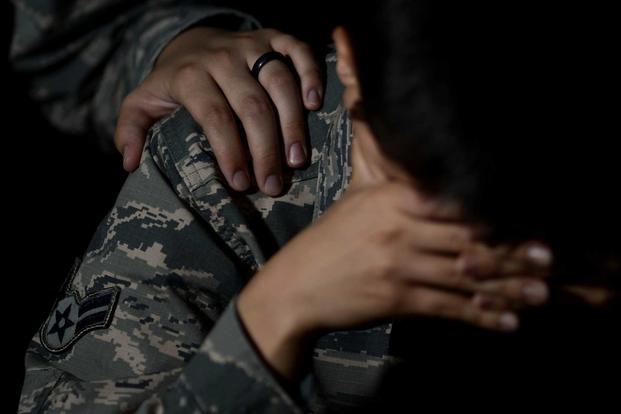NATIONAL HARBOR, Maryland -- As the Air Force struggles with a sharp rise in suicides this year, "toxic" and uncaring leadership has emerged as a major factor in the well-being of airmen -- an issue the service needs to tackle head-on, Chief Master Sergeant of the Air Force Kaleth Wright said Tuesday.
Air Force units were ordered in August to hold a one-day "tactical pause" to reflect on wellness and resiliency after 78 airmen took their own lives between Jan. 1 and July 31. Following the stand-down, a Facebook support group called Air Force Wingman Outreach emerged to help service members in crisis.
Within the group, members cited unresponsive mental health services, concerns about security clearances and fear of being stigmatized by peers for getting mental health treatment as reasons why airmen don't reveal their personal struggles.
But the most common thread running through many frustrated service members' posts has been bad leadership, Wright said.
Related: Air Force to Pause Operations After Spike in Suicides
The nearly 30,000 group members are "mostly talking about us," he said.
"They are talking about leadership, about leadership being toxic, about leadership not being able to connect, about leadership not caring," Wright said here at the Air Force Association's 2019 Air, Space & Cyber Conference.
By Aug. 1, the Air Force had already exceeded the number of suicides in all of 2018 by nearly 20 people. At the time, Air Force Chief of Staff Gen. David Goldfein urged commanders to use the pause to engage with airmen personally on sensitive issues.
"Hopeful to hopeless ... what's going on?" he wrote in a letter to all commanding officers. "It's our job to find out."
The Air Force senior leadership said individual attention, not sweeping programs by the Defense Department and military services, is what's needed to reduce suicides and suicide attempts.
"I don't think the answer resides in the Pentagon," Wright said. "Some of the feedback we've gotten is people are tired, overworked, undermanned, under-resourced. ... Part of it just belongs to us," he said, referring to Air Force leaders.
To address bad or ineffective leaders in the ranks, Goldfein said the service continues to work to develop and nurture leaders and flush out those who may "damage a population" or are "toxic."
It is up to fellow leaders to "pull the red guarded switch" if they become aware of toxic leaders, he said, adding that new initiatives, like a 360-degree review that includes feedback from subordinates, will help.
"It's on all of us to ensure that we don't allow toxic leaders to get in positions of authority. Do they sometimes exist? Yes. Are we doing better to weed them out? I certainly hope so," Goldfein said, also at the conference.
Last year, a total of 325 active-duty service members took their lives, including 58 Marines, 68 Navy sailors, 60 Air Force airmen, and 139 Army soldiers, according to the Department of Defense quarterly suicide report.
The 2018 total surpassed the number of active-duty personnel who died by suicide in 2012, the record since the services began closely tracking the issue in 2001.
Wright urged personnel to reach out when they see a person struggling.
"I've talked to a lot of airmen who have thought about it, and I can count on my pinky the number who said the reason they didn't [act on suicide] was because of some program, some process, some training," he said.
"Every single one of them said it was because of this person, this supervisor, this commander, this teammate, this person that I connected with that showed some interest in me and my well-being ... we have to do this together."
If you or someone you know needs help, the Veterans Crisis Hotline is staffed 24 hours a day, seven days a week, at 800-273-8255, press 1. Services also are available online at www.veteranscrisisline.net or by text, 838255.
--Patricia Kime can be reached at Patricia.Kime@Military.com. Follow her on Twitter at @patriciakime.
Read more: Check out the Air, Space & Cyber conference













